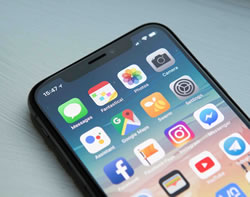Mike Ghaffary* says it’s all but assumed that anything a mobile app does to our behaviour is bad for us, but what if they were made to modify our behaviour for the better?

Photo: William Hook
In 2007 the iPhone was released to the world.
It was a pivotal moment in the history of consumer technology, bringing instant connectivity to user fingertips.
Then, in 2008, the iPhone App Store was announced, and consumer software would never be the same.
All of a sudden calling something an “Internet company” made it sound old, and non-mobile natives like Facebook rushed to embrace the iPhone platform, while apps like Uber went native to the iPhone right away.
In 2019, iPhones are more than a consumer software platform, they are a lifeline, giving many people their primary access to communication, transportation, food delivery, and social media.
A decade has passed since that initial optimistic phase of mobile devices and apps, and now the mood is decidedly more pessimistic.
It’s all but assumed that anything a mobile app does to your behaviour is bad for you, and statistics abound about increased depression rates associated with social media usage.
Apple itself introduced a Screen Time app to draw attention to how much you use your phone, and to get you to use their very own device less.
Can apps be good for us?
The question it seems no-one is pausing to ask is: how can apps modify your behaviour for the better?
Underneath all the pessimism, many apps are providing direct behaviour interventions for the better.
The easiest example of this is the set of meditation apps, such as Calm and Headspace.
Whatever you believe about meditation, it’s hard to argue that if an app helps bring people peace of mind and calm, it isn’t a neutral to positive behavioural intervention.
Exercise apps and consumer tech are another category that can be seen as a positive behavioural intervention.
I’m an investor in Strava, for example, which uses the same gamification principles and leaderboards employed by companies like Zynga, but applies them to real-world exercise.
This can lead to a powerful incentive system for better exercise and health.
What kind of apps could help?
What are the other areas where an app can make a direct behaviour intervention that improves lives?
Now that consumers are more aware of the downsides of being addicted to their phones, will they seek out these behavioural positive apps?
What’s good for us doesn’t always sell better than what’s bad for us — just ask cigarette companies.
Here are a couple of new areas that I haven’t found great apps for.
If you are building an app or know one in this area, please contact me.
Mindset interventions: The most well known and studied mindset intervention is the growth mindset, based on the work of Stanford Psychology Professor Carol Dweck.
In a study of thousands of students’ attitude, Dweck demonstrated that those who believed that they can get smarter, or that their abilities were changeable when they put in extra time and effort, reached higher levels of achievement.
However, those who believed their abilities were fixed became more discouraged by small mistakes and achieved less.
How might an iPhone app encourage the growth mindset
Serotonin boosts without pharmaceuticals: So much of iPhone apps have been centred on a constant flow of dopamine rushes, but an app could also provide a serotonin boost.
Serotonin is the neurotransmitter in your brain associated with long-term happiness, feelings of love and connectedness, and satisfaction.
Drugs like Prozac increase your serotonin levels to combat depression, but could an app do the same thing?
Could showing someone photos of loved ones, family, or other stimuli create a similar serotonin boost that would be measured, but with less risk of side effects?
An app could also measure how often someone is complying with that regimen, which has been a big challenge for drug companies.
How big is the opportunity?
One of the reasons meditation apps like Calm and Headspace have effectively scaled is because they recognised a way to deliver a behaviour-changing practice in condensed, small segments that were easily accessible to all, especially beginners.
In the long-term, however, these positive behaviour inducing apps have the potential to scale to major levels if they can leverage a few strategies to retain and grow user bases:
- Gamification: The opportunity to engage and motivate users to achieve positive behaviour goals, like Strava.
- Network Effects: Use social interactions to highlight goals, motivate individuals, and spot trends. Each additional user on the platform adds additional value.
- Data Analysis & Feedback: Technology platforms have a unique opportunity to collect and analyse data about when individuals perform certain behaviours with what frequency and in turn provide personalised feedback on behaviour. Platforms that can master data collection and analytics in the behaviour space have a potentially huge differentiation opportunity.
iPhone apps have the potential to modify behaviour for good.
If iPhones have become a lifeline, let’s design ways to leverage them in constructive ways to improve everyday behaviour, reviving the 2007 optimism that accompanied the iPhone’s release.
* Mike Ghaffary is a General Partner of Canvas Ventures. He tweets at @newmike.
This article first appeared at www.forbes.com.
Disclosure: The author is an investor in Strava, mentioned in this article.




